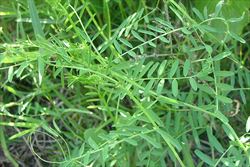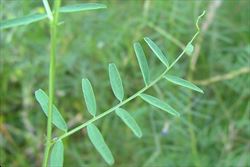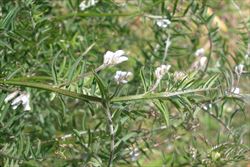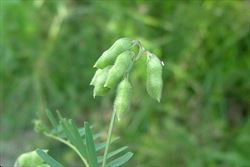Click on images to enlarge

climbing habit (Photo: Sheldon Navie)

once-compound leaves (Photo: Sheldon Navie)

close-up of leaf, with several elongated leaflets, and ending in tendrils (Photo: Sheldon Navie)

hairy stems and young flower clusters in the upper leaf forks (Photo: Greg Jordan)

close-up of tiny white flowers (Photo: Sheldon Navie)

immature fruit (Photo: Sheldon Navie)

close-up of hairy immature fruit, each usually containing two seeds (Photo: Sheldon Navie)

mature fruit (Photo: Rob and Fiona Richardson)

close-up of seeds (Photo: Steve Hurst at USDA PLANTS Database)
Scientific Name
Vicia hirsuta (L.) Gray
Synonyms
Ervum hirsutum L.
Family
Fabaceae (Queensland, the ACT, Victoria, Tasmania, and the Northern Territory)Fabaceae: sub-family Faboideae (New South Wales)Leguminosae (South Australia)Papilionaceae (Western Australia)
Common Names
hairy tare, hairy vetch, tare vetch, tiny vetch
Origin
Native to northern and central Africa, the Azores, the Madeira Islands, the Canary Islands, Europe, the middle-east, western Asia, Russia, China, Japan, Korea, Taiwan and the Indian Sub-continent.
Naturalised Distribution
Widely naturalised in southern and eastern Australia (i.e. in south-eastern Queensland, eastern New South Wales, the ACT, Victoria, Tasmania, south-eastern South Australia and south-western Western Australia). Also naturalised on Norfolk Island.
Widely naturalised overseas in North America (i.e. Canada and the USA), Mexico, southern Africa (i.e. South Africa), south-eastern Asia (i.e. Indonesia and Papua New Guinea), the Mascarenes (i.e. Mauritius and La Reunion) and New Zealand.
Notes
Tiny vetch (Vicia hirsuta) is regarded as an environmental weed in Victoria and Western Australia.

